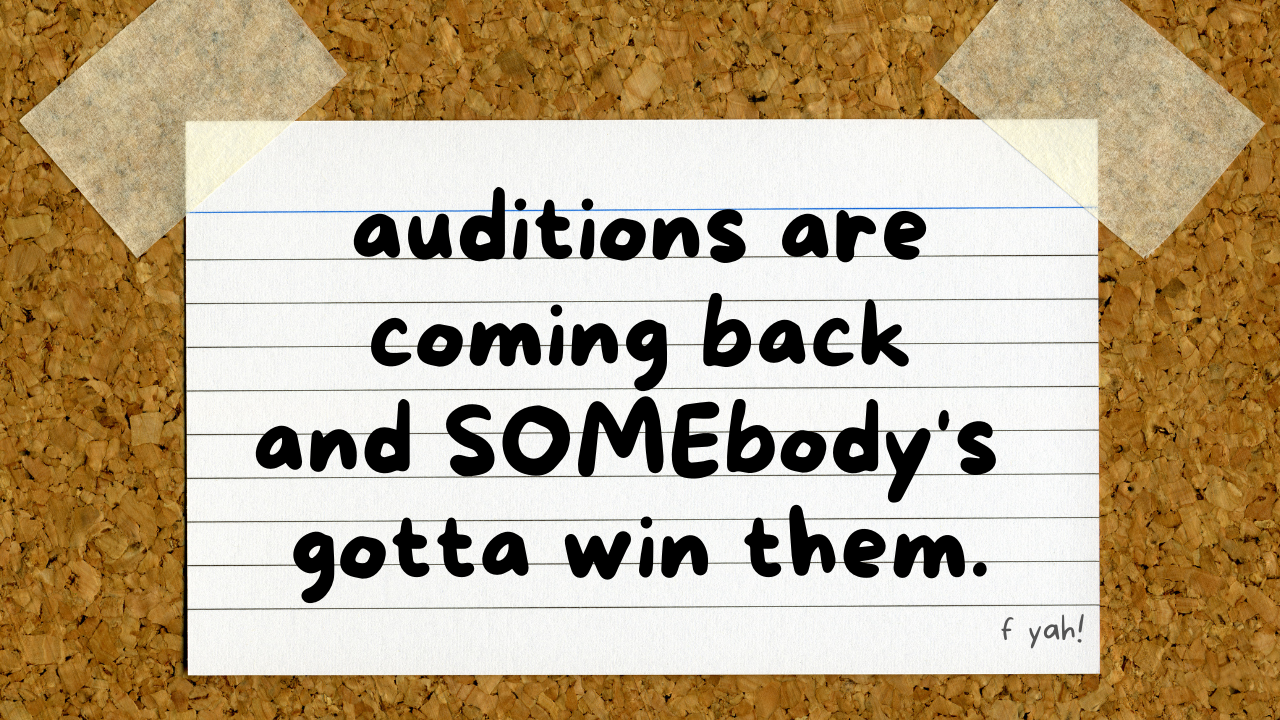i have a verbier audition on january 22nd.
then in february i have 6 more auditions:
PMF on 2/3
youth orchestra of the americas on 2/5
music academy of the west on 2/6
schleswig holstein on 2/7
NRO on 2/12
annapolis symphony on 2/19
they’re all in new york city, which means they’re “in town,” except for that i’m renting a car to drive down to annapolis on 2/19. then to round it all out i’m taking the tanglewood music center audition on march 5th.
that was my 2006 summer festival audition season.
lololololol
and oh my god, i’m glad that part of my life is over. check out the amazing results! (don't get hung up on all the rejections. i was a freshman and punching well above my weight. everybody has rejections, and you will, too.)
and i’m sure your schedule looks a little like this, although maybe instead of summer festivals they’re college auditions.
today’s blog is a strategy to prepare for multiple auditions.
there’s a lot of ways of doing this wrong. in fact, there’s so much work to be done that it would be easy to waste vast amounts of time.
today i’m going to outline a method of dealing with a schedule like this so that you can get the most out of every hour of practicing that you do. specifically, i want to put you in the best position for as many summer festivals as possible.
and to make your life even easier, i've gone ahead and combined 3 audition lists from upcoming summer festival auditions to show you exactly how it's done. you can download it right here:
so you’re preparing to take a ton of auditions. here are the problems:
Write here...
they all have different lists
they’re spaced out inconveniently
it’s busy: everyone just got back to school
if you were to prepare for each audition separately
pretend that my 2006 audition schedule is your 2016 audition schedule. if you were to prepare for each one of them SEPARATELY, you might be at a different place on your timeline for each one of those auditions.
you might start working on the verbier list in late november, after which you can start self-recording in mid-december. at the same time you’re beginning to feel comfortable with that list, you probably would have to start learning the notes of the NRO and annapolis auditions. each day you would be doing a little note-learning, a little self-recording, and a little hyperventilating.
every time you switch activities, it wastes time.
if you were going to make 10 long island iced teas, does it make sense to make one from start to finish, then the next, then the next? each one you would have to get out the glass, put in the ice, then separately add the perfect amount of rum, gin, tequila, triple sec, coke, and lemon. to me, it makes sense to first get all 10 glasses onto the counter, then fill all of them with ice, then take out each liquor and pour it into all 10.
switching from rum to gin wastes time because you have to take the cap off of each one. once you have the rum open, pour it in all the glasses! once you have your metronome out and you’re in the note-learning mindset, do that to everything.
i can’t decide if that’s a good analogy. probably not. either way, my experience with auditioning is exactly that.
if you begin the activity of note-learning, and you do it for a whole bunch of excerpts, it’ll start to get really efficient. you’ll dive into the routine and you’ll just become a machine. each excerpt will be better than the last and it’ll get faster and more effective as you go. then you can move onto self-recording. the first excerpt will take a little bit of transition and getting used to the new routine. the second excerpt will be easier. etc.
if you’re preparing for multiple auditions, prepare them as one unit.
here are the action steps:
step one: start a composite list
the first thing to do is to combine all the audition lists of everything that you're thinking of doing into a compiled audition list. it’s like a normal audition list, but instead of just writing down this information:
prokofiev: lieutenant kije - #1-2
you’re also going to document all the auditions that excerpt will be prepared for, including the exact measure numbers:
prokofiev: lieutenant kije
tanglewood - #1-2
NRO - #1-2, 11-12
schleswig-holstein - #1-2
this is going to give you a big picture view while you’re practicing, along with details on what every audition asks for from that piece as you’re preparing.
step two: reconsider whether you’re taking the right auditions
is it realistic to take all of those auditions? is it too much work, or not enough?
you want to get the most bang for your buck. you want to do a realistic amount of work that puts you in the running for the highest number of auditions. every audition you’re fully prepared for will increase your odds of getting into something. if you’re going to prepare 15 excerpts, it should prepare you for 3 or 4 auditions. not just 1.
if you look at the list and there are a ton of excerpts that are just being prepared for one audition, is that the best use of your time?
and if you add an audition, how much is it going to grow your composite list?
i wrote about how to choose between different auditions here: 5 ways to decide which audition(s) to take: an epic conundrum.
make any audition subtractions or additions that you want to. you can still make a decision like this later, but it’s always better to plan your work early so you don’t waste time or add any last minute excerpts. if your plan is super ambitious, you’ll know that right from the start and you can attack every day with fury.
step 3: prepare the composite list as one audition
if you put all of the lists together, then you’re not going to be thinking about preparing different lists for different times. you’re going to think about it as preparing one list. whatever process you go through to bring your excerpts to audition-ready status, you can apply it thoroughly and completely for all the excerpts you need.
if you start new excerpts halfway through audition season, then that’s puts those newsexcerpts at a disadvantage. one of two things is going to happen: you’re going to ignore the excerpts you already learned, or you’re not going to learn the new ones as well. you’ll have uneven work on different parts of the list, and that can cause problems with your confidence and consistency.
step 4: as each audition happens, make a new, smaller list
traditionally, as you go through audition season, it seems like your work expands. you focus so deeply on that first audition, and when it’s over you just have to dive into a new list. work just builds up from one audition to the next.
the advantage of combining your lists in this way is that it actually feels like your work gets easier and easier throughout the season. you front-loaded your work.
after each audition, make a new compiled list and cut out all of the excerpts from the audition that’s over. that part of your list is irrelevant now. your list actually looks smaller and easier to tackle than before.
instead of ramping up and burning out by the end, it gets easier and easier.
oh, and don't forget to take a peek at exactly how these combined lists look.
i wanted to show you not only why to do it, but how to do it and what it should look like. so i combined three audition lists in my signature way that i've been doing ever since freshman year. you can download it here:




















i've worked with hundreds of musicians on audition preparation. and nothing - NOTHING - has been as effective and life-changing as when they start self-recording the right way.